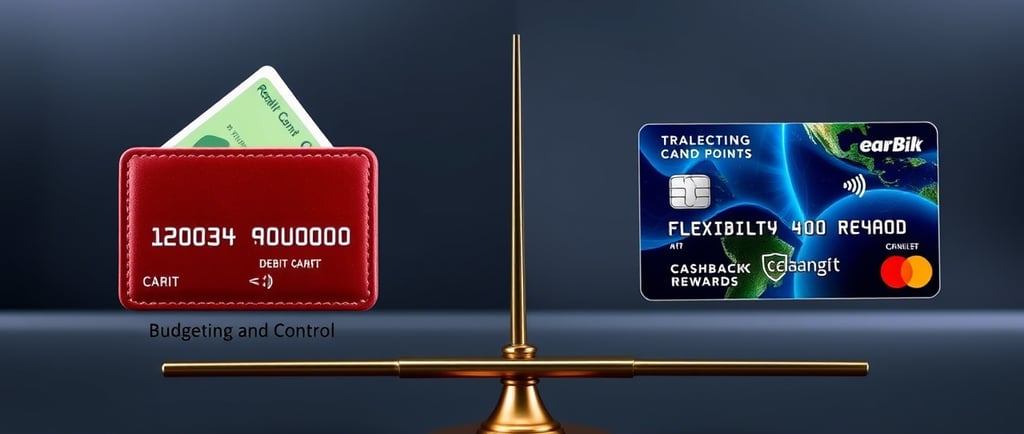Debit vs. Credit Cards: What's the Difference and Why It Matters
Understanding the fundamental differences between debit and credit cards is crucial for making informed financial decisions. While both plastic payment methods may look identical and function similarly at checkout, they operate on entirely different financial principles that can significantly impact your budget, credit score, and financial security.
6/8/20253 min read


Debit vs. Credit Cards: What's the Difference and Why It Matters
Understanding the fundamental differences between debit and credit cards is crucial for making informed financial decisions. While both plastic payment methods may look identical and function similarly at checkout, they operate on entirely different financial principles that can significantly impact your budget, credit score, and financial security.
How They Work: The Core Difference
Debit cards draw money directly from your checking account in real-time. When you make a purchase, the funds are immediately deducted from your available balance. Think of it as electronic cash – you can only spend what you actually have.
Credit cards, on the other hand, allow you to borrow money from the card issuer up to a predetermined credit limit. You're essentially taking out a short-term loan for each purchase, which you'll need to repay later with your monthly statement.
Financial Impact and Budgeting
The immediate access to your own funds with debit cards makes budgeting more straightforward. You cannot overspend beyond your account balance (unless you've opted into overdraft protection), which naturally prevents debt accumulation. This real-time spending constraint can be particularly beneficial for those learning to manage their finances or trying to stick to a strict budget.
Credit cards offer more flexibility but require greater discipline. The ability to spend beyond your immediate means can be advantageous for managing cash flow or handling emergencies, but it also creates the risk of accumulating high-interest debt if balances aren't paid in full each month.
Security and Fraud Protection
Credit cards generally provide superior fraud protection. Under federal law, your maximum liability for unauthorized credit card charges is $50, and most issuers offer zero liability policies. The dispute process is typically more straightforward since you're fighting charges on borrowed money rather than funds already taken from your account.
Debit card fraud protection is more limited. While federal regulations cap liability at $50 if reported within two business days, this can increase to $500 if reported within 60 days, and potentially unlimited liability beyond that timeframe. More importantly, fraudulent debit card transactions immediately impact your actual money, potentially causing bounced checks or declined legitimate transactions while disputes are resolved.
Credit Building and Financial History
Credit cards are essential tools for building credit history, which affects your ability to secure loans, mortgages, and even rental agreements. Responsible credit card use – keeping balances low and making payments on time – demonstrates creditworthiness to future lenders.
Debit cards don't contribute to credit history since you're spending your own money rather than borrowed funds. This means you miss opportunities to build the credit profile necessary for major financial milestones.
Rewards and Benefits
Credit cards typically offer more robust rewards programs, including cash back, travel points, and purchase protections. Many provide additional benefits like extended warranties, rental car insurance, and purchase price protection. These perks can add significant value for regular users who pay their balances in full.
Debit card rewards are generally more modest, though some banks offer cash back or points programs. The benefits rarely match those available with credit cards.
Interest and Fees
Debit cards don't charge interest since you're spending your own money. However, they may incur overdraft fees if you spend more than your account balance, and some banks charge monthly maintenance fees or ATM fees.
Credit cards charge interest on carried balances, often at rates exceeding 20% annually. However, if you pay your full statement balance by the due date, you'll avoid interest charges entirely during the grace period. Annual fees vary widely, from $0 to several hundred dollars for premium cards.
When to Use Each Card
Use debit cards for:
- ATM cash withdrawals (usually lower fees with your own bank)
- Everyday purchases when you want to limit spending to available funds
- Situations where you want to avoid any possibility of debt
- Small, frequent purchases where rewards aren't significant
Use credit cards for:
- Online purchases (better fraud protection)
- Large purchases where you want additional protections
- Travel expenses (better dispute resolution and travel benefits)
- Building credit history
- Maximizing rewards on regular spending categories
- Emergency expenses when you need time to pay
Making the Right Choice
The choice between debit and credit cards isn't necessarily either/or. Many financially savvy individuals use both strategically: credit cards for most purchases to maximize rewards and protection, while maintaining the discipline to pay balances in full, and debit cards for cash withdrawals and situations where they want to limit spending.
Your personal financial situation, spending habits, and self-discipline should guide your decision. If you struggle with overspending or are working to eliminate debt, debit cards can provide necessary guardrails. If you're disciplined about payments and want to maximize benefits while building credit, credit cards offer superior advantages.
Understanding these differences empowers you to choose the payment method that best serves your financial goals and protects your economic well-being. The key is using whichever option you choose responsibly and in alignment with your broader financial strategy.